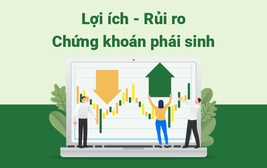The concept of maturity date is probably not too strange for longtime derivatives investors. However, there are still some new investors who do not really fully understand the nature of this maturity date in securities. To learn more, let's learn about derivatives' maturity dates through the article below.
What is Derivative Maturity?
Derivative concept
A derivative is defined as a financial instrument in the form of a contract in which the value of the derivative depends on one or more of the underlying assets.
Specifically, the contract confirms the rights and obligations of the parties to the payment of money, the transfer of the amount of the underlying asset at a specified time in the future at a certain pre-agreed price. The underlying assets of derivative securities are also regulated as securities, stock indices or other assets (food, agricultural products, metals, etc.)
Or to put it more simply, in the Vietnamese market, derivative securities products allow investors to bet on the "increase" or "decrease" of the underlying asset in the future. If that change happens as the investor predicts, the investor will make a profit.
So what is the derivative maturity date?
Derivative maturity is also known as derivative maturity date, English is called Expiration Date. It is the last trading day of derivative contracts. On the expiration date, the current month's contract is cashed and carried over to the next month for trading.
It can be said that on the derivative maturity date, investors will take profit or stop loss and switch to a new derivative contract.
Derivatives Maturity Time
When participating in the transaction, investors should pay attention to choose the contract with the appropriate maturity month. Unlike the underlying stock market, each futures contract in a derivative has a specific expiration date. On that date, contract transactions will cease and be cashed.
This date is specified as the 3rd Thursday in the contract expiration month. In which, the maturity months are the current month, the next month and the last month of the last 2 quarters, respectively.
Does derivative maturity affect the market?
It can be confirmed that the derivative maturity date has a great influence on the market, the general trend before the maturity date is quite volatile. Because on the expiration date, investors, regardless of their position, must either exercise their position in the trade or choose not to exercise to make the contract worthless. Therefore, they can sell/don't sell and buy/don't buy in the trade to take profit or stop loss.
This is also the time for investors to know if derivatives trading results are effective and profitable. Based on the statistical data from 2017 to the present, the ATC sessions have sudden increase and decrease, the trading codes on the floor are different from the previous ATC session and following the downtrend mainly.
For example: In the first quarter of 2022, the Vietnamese stock market has 3 trading sessions: Code VN30 F2201 has a due date arising on January 1, 2022, the first trading day on November 20, 2021 and the last transaction. same on January 21, 2022. In the early stages there is not much volatility or trading change from the market. But since December 15, 2021, the market became more bustling and on January 19, 2022 (two days before the expiration date), the market dropped sharply.
Effect of derivative maturity on the market
Notes when trading derivatives maturity date
At the end of the trading session on the expiration date of the futures contract, the index of the futures contract will be equal to the index of VN30, the difference between the futures contract and VN30 is the investor's profit/loss.
Open positions will be automatically closed at the end of the transaction and the difference between the score between the futures contract and VN30 is the investor's profit/loss and will be paid on that day.
For investors who have not opened or closed a position before the ATC session of the expiration date takes place, and want to find a quick profit in just 30 seconds, the investor needs to determine the point difference between the index of similar contracts futures and the vn30 index to make a decision to place an ATC long or ATC short order.
For investors who are opening positions, if the current position is favorable with the point difference between the futures index and VN30, investors can hold and maintain this position until the end of the ATC session. . If the current position is unfavorable, the investor can place an ATC order with twice the amount of the current position to be able to reverse the position.
Summary
Hopefully, the information in the above article of PHS has helped investors understand what the derivative maturity is, as well as information about the maturity date. This can help investors be more proactive in their investment. Follow PHS to update knowledge about financial investment - securities.










